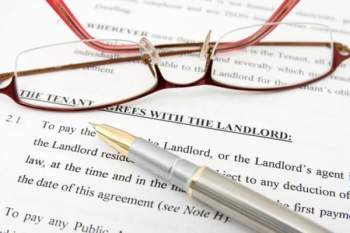
Massachusetts Landlord Tenant Law

The following information will answer all of your pressing questions concerning Massachusetts Landlord and Tenant Law.
MA Landlord and Tenant Law: Am I Allowed to Break my Lease?
According to Massachusetts Landlord and Tenant Law, breaking a lease is not a criminal law matter. The basic premise concerning this issue is: if you have a lease rather than a tenancy at will, then you cannot break your lease. According to MA Landlord and Tenant Law, a lease is a type of contract. When you sign a lease, you—and your landlord-- are bound by the document’s terms. Therefore, the rent serves as the written record of your agreement to remain in the rental space and pay the specified rent until the contract expires. If you fail to meet these terms, you may still be responsible—according to MA Landlord and Tenant Law-- for rent payments until the end of the lease.
All that said, Massachusetts Landlord and Tenant Law obligates all landlords to make reasonable efforts to rent the space to someone else and, thus, reduce or eliminate your liability for the rent owed for the remaining term of the contract.
Can I take My Security Deposit Back if I foreclose on the Unit?
Even if you foreclose on the unit, Massachusetts Landlord and Tenant Law provide you with a few options to secure your security deposit. MA Landlord and Tenant Law proclaims that if the bank takes possession of your unit, it cannot attempt to collect your last month’s rent or the security deposit. Massachusetts Landlord and Tenant Law states that your landlord is required to transfer your security deposit to the bank that is protected from the individual’s creditors. If your landlord—for some reason—claims that your deposit was lost to his/her creditors, you are allowed—according to MA Landlord and Tenant Law—to sue for the deposit plus triple the damages. Also, if your landlord files for bankruptcy protection, you—according to Massachusetts Landlord and Tenant Law—will not be able to sue him/her until you secure permission from the bankruptcy court. In this situation, you will need to hire an attorney to help you.
Massachusetts Landlord and Tenant Law states that as long as the landlord has followed several legal requirements for holding, taking and using a security deposit, the state allows him/her to use the tenant’s security deposit for any of the following: 1.) MA landlord tenant laws states that any unpaid rent not lawfully withheld; 2.) MA landlord tenant laws states that any unpaid rises in real estate taxes; and 3.) MA landlord tenant laws states that any amount necessary to repaid damages to the apartment caused by the tenant. According to Massachusetts Landlord and Tenant Law, landlords are given thirty days from the termination of the rental agreement or from the day the tenant vacates the tenant to return the deposit or any remaining balance along with a list of damages.
Massachusetts Landlord and Tenant Law requires your landlord to return the security deposit within 30 days after you leave the rental unit. Typically, if you caused damage (beyond normal wear and tear) to the space your landlord—according to MA Landlord and Tenant Law—is allowed to use a portion of the security deposit to pay for repairs. However, if your landlord does not give you a ‘statement of condition’ at the beginning of the tenancy, it is not possible, according to MA landlord and tenant law-- for the landlord to use the deposit for repairs. Massachusetts Landlord and Tenant Law states that the landlord must provide you with a detailed list of the repairs and the costs associated with each; this list must be given to the renter within 30 days after the move out. The statement must be signed under penalties of perjury. If the landlord does not provide you with this information, or if he/she refuses to return the deposit for whatever reason, you are required—under MA landlord and tenant law--to sue the landlord to get the deposit back. Although this sounds insufferable, Massachusetts’ housing courts are typically friendly to plaintiffs.
MA Landlord and Tenant Law: Can the Landlord Enter my Apartment?
According to Massachusetts Landlord and Tenant Law, a landlord and his/her agent may enter the rental space for several reasons, including: make repairs, inspect the space or to show the rental space to prospective renters. This portion of MA Landlord and Tenant Law; however, requires landlords to provide the renter with reasonable notice (24 to 48 hours) and to enter only at reasonable hours (9 a.m. to 5 p.m.).
MA Landlord and Tenant Laws: Rights after Foreclosure
According to Massachusetts Landlord and Tenant Law, foreclosure does not automatically terminate your tenancy. Regardless of what the new owner or the bank tells you, you are not required—based on Massachusetts Landlord and Tenant Law—to leave your apartment just because your landlord lost the property to foreclosure. If you are a formal tenant (tenant with a lease, tenant with a housing subsidy or tenant at will), the tenancy will continue after foreclosure. Subsidized tenancies and tenancies at will continue under the same terms as with their old landlord. In this situation, all leases are converted into tenancies at will, with the company or person purchasing the property at the foreclosure auction serving as the new landlord and owner.
As a tenant, you are still responsible for paying the rent. Until the sale of the apartment, you should continue to pay rent to your old landlord.
Massachusetts Landlord and Tenant Law: Rent Increases
If you hold a lease for a period of time, your landlord—under Massachusetts Landlord and Tenant Law—is not allowed to raise the rent until the lease ends. With tenancies-at-will; however, you and your landlord agree that you will remain a tenant and pay specified rent until one of you decides you wish to change the terms of the lease. In this formation, either you or the landlord will only provide notice of the intended change.
If you are living under a tenancy-at-will lease (month to month lease), your landlord is required to provide notice of his/her intent to end your current tenancy and begin a new one with a higher rent at least 30 days or one month prior to the day your next rent payment is due—whichever period is longer. In most other rental formations, the landlord’s ability to raise rent is limited by the market and what renters are able or willing to pay.
Massachusetts Landlord and Tenant Law: Can I refuse to give my landlord permission to enter my rental space?
MA landlord and tenant laws state that with at least one day’s notice, you are required to allow your landlord entry to: make repairs; inspect the apartment; show the apartment to prospective realtors, buyers or tenants; inspect the rental space for damages within the last month of your tenancy
Massachusetts Landlord and Tenant Law: Am I Allowed to withhold rent if there is a problem with the rental space and I have to pay for repair costs?
Yes, you are allowed to withhold rent; however, it may be done only when specific conditions apply. You may withhold rent from your landlord if the Board of Health views certain conditions within your space as being unsafe or hazardous to the occupant’s health. In this situation, rent may be withheld if the landlord receives written notice of these violations and if he/she failed to repair the space in a timely manner. No matter the circumstance, you may only deduct a total of 4 months’ rent. Before paying for repairs, you should first speak with the landlord, and in more severe cases, a legal specialist.


















